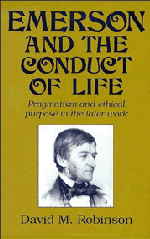Book contents
- Frontmatter
- Contents
- Acknowledgments
- List of Abbreviations
- Introduction
- 1 The Mystic and the Self-made Saint
- 2 Politics and Ecstasy
- 3 The Text of Experience
- 4 “Here or Nowhere”: Essays: Second Series
- 5 The Eclipse of the Hero: Representative Men
- 6 The Old and New Worlds: English Trait
- 7 “Work Is Victory”: The Conduct of Life
- 8 “Plain Living and High Thinking”: Society and Solitude
- 9 Toward a Grammar of the Moral Life
- Notes
- Work Cited
- Index
- Titles in the series
3 - The Text of Experience
Published online by Cambridge University Press: 18 December 2009
- Frontmatter
- Contents
- Acknowledgments
- List of Abbreviations
- Introduction
- 1 The Mystic and the Self-made Saint
- 2 Politics and Ecstasy
- 3 The Text of Experience
- 4 “Here or Nowhere”: Essays: Second Series
- 5 The Eclipse of the Hero: Representative Men
- 6 The Old and New Worlds: English Trait
- 7 “Work Is Victory”: The Conduct of Life
- 8 “Plain Living and High Thinking”: Society and Solitude
- 9 Toward a Grammar of the Moral Life
- Notes
- Work Cited
- Index
- Titles in the series
Summary
THE DOUBLE CONSCIOUSNESS
“We have our theory of life, our religion, our philosophy; and the event of each moment, the shower, the steamboat disaster, the passing of a beautiful face, the apoplexy of our neighbor, are all tests to try our theory, the approximate result we call truth, and reveal its defects”
(W, 10:132–3).Emerson's lecture series “The Times” was an attempt to capture a cultural moment, but the lectures also carried a less prominent personal agenda. “The Transcendentalist,” the central lecture of the series, explained the “newness” to a curious public, but on a deeper level it served Emerson as veiled autobiography, the dramatization of his own spiritual crisis in the figure of the transcendentalist. The transcendentalist embodies the political dilemma that emerged in the lectures, sharing the reformer's incapacity to accept the state of things, but also holding a distrust of solutions that are exclusively material. In a tone that borders on the petulant, Emerson gave voice to the transcendentalist's resistant posture: “I can sit in a corner and perish, (as you call it,) but I will not move until I have the highest command” (CW, 1:212). He is withered by the contempt and impatience of conservative and reformer alike, and his refusal to act is a paralysis, but as Emerson passionately argues, a paralysis that is the best hope of the human spirit: “Will you not tolerate one or two solitary voices in the land, speaking for thoughts and principles not marketable or perishable?” (CW, 1:216).
- Type
- Chapter
- Information
- Emerson and the Conduct of LifePragmatism and Ethical Purpose in the Later Work, pp. 54 - 70Publisher: Cambridge University PressPrint publication year: 1993



